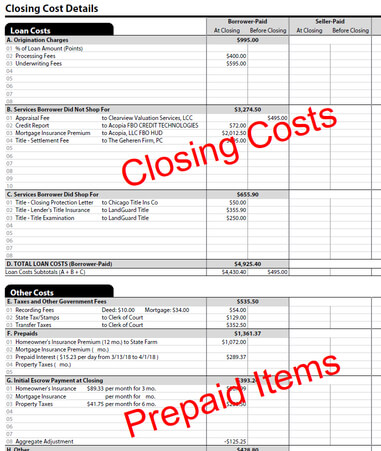 Updated by Craig Berry
Updated by Craig Berry
There's no doubt that mortgage closing disclosures can be confusing.
There are very few instructions to explain the forms, and the documents bear some, but little, resemblance to the Loan Estimate.
The areas that can be most confusing to homebuyers are in Sections F and G known as:
- "Prepaids"
- "Initial Escrow Payment at Closing"
What does prepaid mean?
Prepaid items are exactly what the name implies - payments made in advance of the monies due to obtain your new loan.
These amounts are often necessary to fund what's known as an "escrow" or "impound" account for property taxes and insurance. Lenders often require homeowners, especially those with less than 20 percent down, to have escro accounts associated with their mortgage loan. This means homeowners pay an additional amount each month to an account administered by the lender.
An escrow account on behalf of the lender lowers the its risk by making sure the home is protected. No liens for missed taxes should occur, and property insurance coverage protects the lender's collateral.
What are prepaids on a mortgage?
When it comes to mortgage loans, there are several different types of prepaid items, the most common are:
- Homeowners insurance premium paid up front as well as into an escrow account
- Real estate property taxes paid into an escrow account
- Mortgage interest (also known as per diem interest) that accrues between the closing date and month-end
Prepaid items: taxes and insurance
Typically, one full year of homeowner's insurance is collected and prepaid to your insurance company at closing. Alternatively, some homeowners choose to pay this amount prior to closing.
An additional cushion for homeowners insurance, along with property taxes, are collected and placed into an escrow account. This is so your new lender can build reserves and have enough to pay those bills when they come due.
Prepaids: mortgage interest
Mortgage interest is collected as a prepaid item so the lender can apply it to your first mortgage payment. This way, no matter which day of the month you close, the lender has at least 30 days to enter your data into its system, and issue your first statement.
The amount of interest required varies depending on what time of the month you close your loan. Some homeowners close at the end of the month so that it reduces the interest accrued in advance of your first monthly mortgage payment.
A common misnomer is "skipping a payment." The feeling of skipping that first payment comes because you've paid the first payment at closing, in advance of it actually coming due.
 Difference between prepaids, closing costs
Difference between prepaids, closing costs
There is a difference between prepaids, closing costs and fees. Prepaid items are not closing costs. They are monies that would have been paid anyway -- new home loan or not.
Prepaid items, listed above, are figures on your Closing Disclosure unrelated to the process of getting a mortgage. The exception to this is upfront mortgage insurance premiums (MIPs) for Federal Housing Administration (FHA) mortgage loans.
Closing costs on the other hand, describe all of the fees or charges for actions or items connected to originating and closing a mortgage loan. Closing costs can include things such as:
- Payments to title companies
- Attorney fees
- Governmental title recording fees
- Lender fees
Some homebuyers wonder, "Is the inspection part of closing costs." The answer is "typically not." Generally the homebuyer orders and pays for an inspection to gain a detailed understanding of the home's condition. Sometimes, the homebuyer is able to use the inspection report to gain price concessions from the seller or to negotiate certain repairs to the home. In cases where a homebuyer doesn't pay for the inspection fee promptly at the time of service, inspection fees could be handled at closing as part of the closing costs.
Closing costs and prepaids factor into mortgage loan comparisons
Understanding what is included in closing costs for buying a house and the difference between prepaids, closing costs and other fees associated with closing can help you shop for lower mortgage rates.
Prepaid items should be the same from one lender to the next. They are separate from your mortgage closing costs, rate and terms. As such, you can remove them from your cost comparisons.
Separating closing costs and prepaids should make comparing mortgage rates easy. If you're unsure about whether a certain item is included in closing costs or prepaids, just ask yourself a simple question: "Is this a charge that I would have if I wasn't borrowing to buy the house?"
If the answer is "yes," it's a prepaid item.


